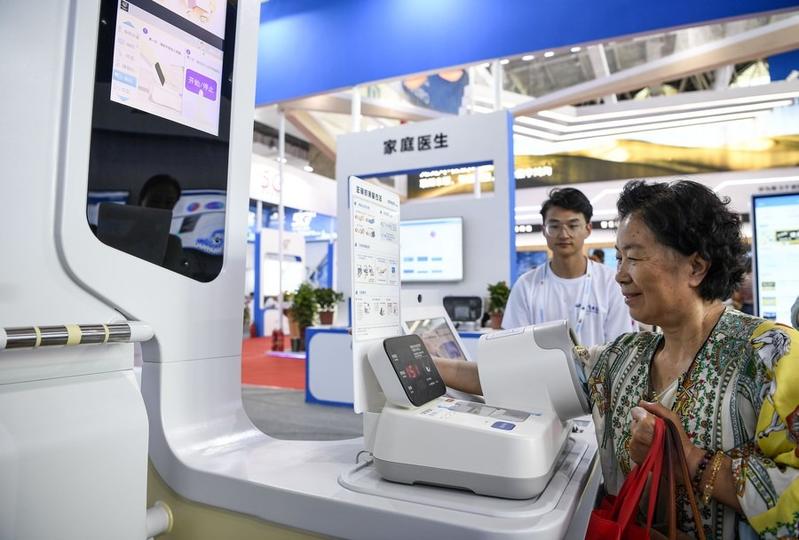 This undated file photo shows a visitor has her blood pressure measured by a smart sphygmomanometer during an "Internet plus healthcare" exhibition of the ongoing fourth China-Arab States Expo in Yinchuan, Northwest China's Ningxia Hui autonomous region. (PHOTO / XINHUA)
This undated file photo shows a visitor has her blood pressure measured by a smart sphygmomanometer during an "Internet plus healthcare" exhibition of the ongoing fourth China-Arab States Expo in Yinchuan, Northwest China's Ningxia Hui autonomous region. (PHOTO / XINHUA)
China's online healthcare sector is set to see new development opportunities as the COVID-19 pandemic has boosted demand for internet-based healthcare platforms, industry experts said.
Such platforms provide online health and telemedicine services to reduce the burden on hospitals.
With the development of telemedicine, the situation of unbalanced and scarce medical resources nationwide will be alleviated to some extent, they said.
DXY, a leading digital healthcare technology company in China, is speeding up its layout across both upstream and downstream, to cover doctors, pharmaceutical enterprises, medical institutions, consumer products companies, as well as online consultation services for the public.
Li Tiantian, founder and chairman of DXY, said the company will concentrate on physicians and the public, and strengthen its cooperation with professional doctors and enterprises.
Li said DXY has achieved profitability and maintained steady growth. As the Chinese people's awareness of health has risen during the pandemic, the medical and online health industry witnessed explosive growth.
The company received US$500 million in its latest funding round led by Trustbridge Partners, and backed by Tencent Investment and GL Ventures.
DXY plans to consolidate its core pillar-physicians' expertise-and support the growth of Chinese doctors. It'll also forge partnerships with doctors, enterprises, medical institutions and other professional resources to explore more medical and health scenarios.
Li Tiantian, founder and chairman of DXY
"DXY plans to consolidate its core pillar-physicians' expertise-and support the growth of Chinese doctors. It'll also forge partnerships with doctors, enterprises, medical institutions and other professional resources to explore more medical and health scenarios," Li said.
"Through DX Doctor, an online healthcare platform operated by DXY, the company aspires to improve the quality of Chinese people's healthy lives."
Founded in 2000, DXY boasts about 5.5 million professional users, among whom 2 million are registered doctors, or about 70 percent of the total nationwide. It provides academic discussions, continuing medical education and job recruitment services for medical professionals.
ALSO READ: Telemedicine expanded to rural areas
Last month, the company announced it has teamed up with major vaccine enterprises, such as MSD, GSK, Sinovac Biotech Ltd and Hualan Biological Engineering, to establish a vaccine service platform.
It also launched HPV, influenza and shingles vaccination services. Users can make online reservations and choose the nearest offline clinics or hospitals through WeChat accounts, apps and mini programs of DXY.
In response to the pandemic, DX Doctor introduced real-time reports, which have become a source of global data on COVID-19.
It also launched public information products that popularize science, dispel rumors online, offer free consultations and conduct open classes at both physician and public ends.
According to the National Health Commission, the "internet plus medical and healthcare" initiative spawned policies that promoted online diagnosis and treatment, internet hospitals and telemedical services.
Other healthcare platforms have created special services where people can interact with doctors online about their symptoms or simply receive more details about preventive measures during the outbreak.
User inquiries at Haodf, which owns and operates an online healthcare community platform that helps patients find doctors, rose by 60 times between February and March.
New users of Ping An Good Doctor, another healthcare platform, surged by a staggering 900 percent. And, between December 2019 and January 2020, online consultations rose by a whopping 800 percent on a yearly basis.
A report by Analysys, a Beijing-based internet consultancy, said revenue of China's online healthcare industry reached 133.6 billion yuan (US$20.5 billion) in 2019, up from 98.5 billion yuan in 2011.
The figure for 2020 will likely be about 200 billion yuan, up some 47 percent, due to the pandemic, the consultancy predicted.
"Online healthcare platforms not only effectively relieve pressure on hospitals and alleviate problem of unbalanced medical resources during the pandemic, but also reduce contact between doctors and patients and eliminate threats from partial cross-infection," said Chen Liteng, an analyst at the Internet Economy Institute, a domestic consultancy.
He said the online healthcare market is expected to witness explosive growth with supportive policies, the adoption of 5G technology and the internet of things.
Chen Baiping, managing director and partner of Boston Consulting Group, said the pandemic has become a catalyst for digitalization of the entire healthcare industry as well as pharmaceutical companies.
READ MORE: COVID-19 effects push healthcare into digital embrace


